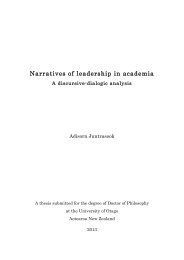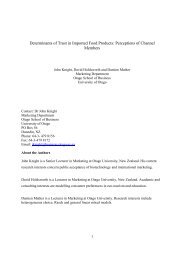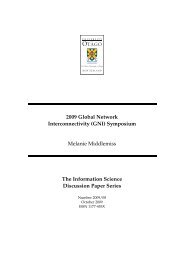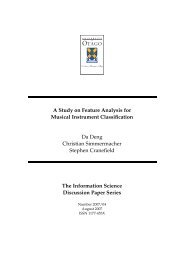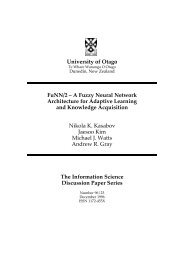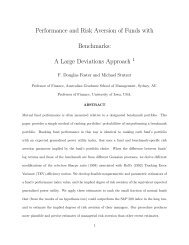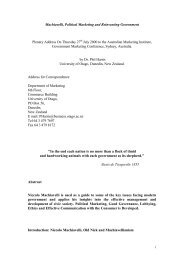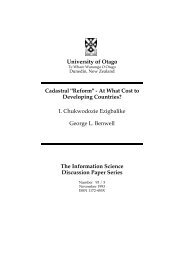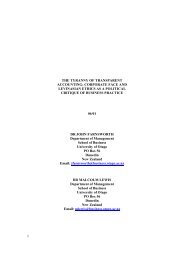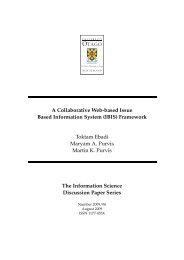Where is R2P grounded in international law? Anne-Marie Judson A ...
Where is R2P grounded in international law? Anne-Marie Judson A ...
Where is R2P grounded in international law? Anne-Marie Judson A ...
You also want an ePaper? Increase the reach of your titles
YUMPU automatically turns print PDFs into web optimized ePapers that Google loves.
CONCLUSION<br />
At first glance <strong>R2P</strong> appeared to be the declaration that the world had been wait<strong>in</strong>g<br />
for. It gave hope to political activ<strong>is</strong>ts, politicians and academics alike and yet th<strong>is</strong><br />
research has shown that <strong>R2P</strong> <strong>is</strong> deficient <strong>in</strong> add<strong>in</strong>g any new aspects to <strong>in</strong>ternational<br />
<strong>law</strong>.<br />
Chapter 1 showed that all states were bound to <strong>in</strong>ternational <strong>law</strong> and other states<br />
through their commitment to the United Nations. The Charter provided us with the<br />
ground<strong>in</strong>g for the rules on threats to the peace and the use of aggression. The Charter<br />
gave precedence to <strong>in</strong>ternational <strong>law</strong> and justice as supreme tenets and each member<br />
agreed to act <strong>in</strong> accordance with these rules. In 2005 each member declared that<br />
certa<strong>in</strong> rules <strong>in</strong> <strong>in</strong>ternational <strong>law</strong> were jus cogens. They asserted that certa<strong>in</strong> customary<br />
<strong>in</strong>ternational rules <strong>in</strong>clud<strong>in</strong>g war crimes and genocide were prohibited <strong>in</strong> <strong>in</strong>ternational<br />
<strong>law</strong>. They agreed that these rules were customary. They declared that they were<br />
prepared to take collective action <strong>in</strong> accordance with Charter (1945) chapters VI and<br />
VIII <strong>in</strong> accordance with the Security Council re<strong>in</strong>forc<strong>in</strong>g once aga<strong>in</strong> their duties<br />
already <strong>in</strong>herent <strong>in</strong> <strong>in</strong>ternational <strong>law</strong> to supply the Security Council <strong>in</strong> a timely<br />
manner with the means necessary to ma<strong>in</strong>ta<strong>in</strong> <strong>in</strong>ternational peace and security. Th<strong>is</strong><br />
showed that <strong>R2P</strong> did not add anyth<strong>in</strong>g new to the ma<strong>in</strong>tenance of <strong>in</strong>ternational peace<br />
and security. It did not give rights to states to <strong>in</strong>tervene <strong>in</strong> any situation that <strong>in</strong>volved<br />
war crimes, genocide, crimes aga<strong>in</strong>st humanity or ethnic cleans<strong>in</strong>g. <strong>R2P</strong> re<strong>in</strong>forced<br />
the duties that were already <strong>in</strong>herent <strong>in</strong> <strong>in</strong>ternational <strong>law</strong>.<br />
The h<strong>is</strong>torical perspective showed that the responsibilities of states were <strong>grounded</strong> <strong>in</strong><br />
the d<strong>is</strong>cussions of the United Nations and the International Law Comm<strong>is</strong>sion’s<br />
proposals on state responsibility. It also showed that the duties and responsibilities of<br />
states were deeply rooted <strong>in</strong> both philosophy and jur<strong>is</strong>prudence of <strong>in</strong>ternational <strong>law</strong>,<br />
reach<strong>in</strong>g back <strong>in</strong>to the 1700s and beyond show<strong>in</strong>g us that <strong>R2P</strong> <strong>is</strong> neither a new idea<br />
nor a new concept and it has developed over centuries not over a few years. Th<strong>is</strong> was<br />
further emphasized by the Draft declaration on the Rights and Duties of States (1949)<br />
whereby the pr<strong>in</strong>ciples entailed reference to refra<strong>in</strong><strong>in</strong>g from the use of force aga<strong>in</strong>st<br />
the territorial <strong>in</strong>tegrity or political <strong>in</strong>dependence of any state. Article 14 also<br />
re<strong>in</strong>forced these duties by declar<strong>in</strong>g that every state has the duty to conduct its<br />
relations with other states <strong>in</strong> accordance with <strong>in</strong>ternational <strong>law</strong> and with the pr<strong>in</strong>ciple<br />
<br />
123



